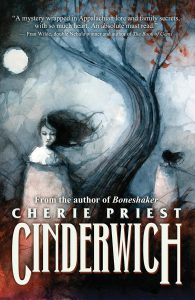Cinderwich by Cherie Priest: Review by Colleen Mondor
 Cinderwich, Cherie Priest (Apex Book Company 978-1-955-76520-6, $21.95, 162pp, tp) May 2024.
Cinderwich, Cherie Priest (Apex Book Company 978-1-955-76520-6, $21.95, 162pp, tp) May 2024.
Cherie Priest’s novella Cinderwich gifts readers with a bit of a haunted tree folktale, some true crime detecting, a frustrated ghost, and a couple of academic ladies with a sometimes prickly friendship who are more than willing to sit through countless diner dinners to get to a much-needed truth. In other words, it’s catnip for readers who like a Southern (rural Tennessee) setting, hunting clues in libraries, bumping into locals who may or may not know the truth (and may or may not be burying bodies in the dead of night), and a set of sisters who, as Priest notes, stepped right out of central casting for The Addams Family. Reader, I was hooked from the moment I read about long missing Ellen Thrush and I’m certain that you will be, too.
Kate Thrush was named for her aunt and has often wondered what became of her. One of Kate’s former professors, Judith Kane, also taught Ellen, who was in a relationship with her at the time of Ellen’s disappearance. While Kate has maintained a distance from the Ellen mystery, Judith, who retained her lost partner’s research and papers, has kept an eye out for any clues in the long cold case. When an article appears in the Chattanooga Times-Free Press about a legend that has grown around an unidentified woman, supposedly named Ellen, whose remains were found 45 years earlier in a tree in the small town of Cinderwich, Judith suggests the two meet there and look for connections to ‘‘their’’ Ellen. Curious, bored, and eager to see her old friend, Kate agrees. Soon enough they are in hotel filled with gothic weirdness and looking for a black gum tree at the end of a road. Kate ends up communicating with a ghost, and Judith reveals what she knows of the town’s intriguing history. Then they meet the women who, as children, found the body and everything, in the very best literary way, gets a whole lot weirder.
The overriding question at the heart of Cinderwich is what happened to Ellen, and Priest has a lot of fun dangling all sorts of possibilities (including a few from Ellen’s own academic research). But the best part of the book is Kate and Judith’s relationship, which is sometimes akin to mother/daughter and sometimes more about two frustrated academics who can sense a story but aren’t sure if they really want to embrace the strange opportunity they’ve stumbled upon. Whether arguing in Waffle House or running for their lives down a deserted blacktop, these women are a pure delight to spend time with, and Priest relishes digging into every nook and cranny of their friendship. They both have their own secrets and worries and bit by bit, as they reveal themselves more to each other, readers will fall even harder for this unlikely detective duo.
Even without the ghost, Cinderwich would be a great mystery but her presence (and the question of what she wants) adds another layer of oddity to the layers of locale and history which combine to makes this story succeed so well. I’ve seen a few complaints that the ending is too ambiguous, but I thought it was pitch-perfect. The whole point of the town is that outsiders will never know what is really going on there (for good reason). Judith and Kate get closer than most, while fortunately not ending up in a tree. If Priest wants to send this duo back out on another adventure, I most certainly would be lined up to go along with them.
Interested in this title? Your purchase through the links below brings us a small amount of affiliate income and helps us keep doing all the reviews you love to read!
This review and more like it in the September 2024 issue of Locus.
 While you are here, please take a moment to support Locus with a one-time or recurring donation. We rely on reader donations to keep the magazine and site going, and would like to keep the site paywall free, but WE NEED YOUR FINANCIAL SUPPORT to continue quality coverage of the science fiction and fantasy field.
While you are here, please take a moment to support Locus with a one-time or recurring donation. We rely on reader donations to keep the magazine and site going, and would like to keep the site paywall free, but WE NEED YOUR FINANCIAL SUPPORT to continue quality coverage of the science fiction and fantasy field.
©Locus Magazine. Copyrighted material may not be republished without permission of LSFF.








